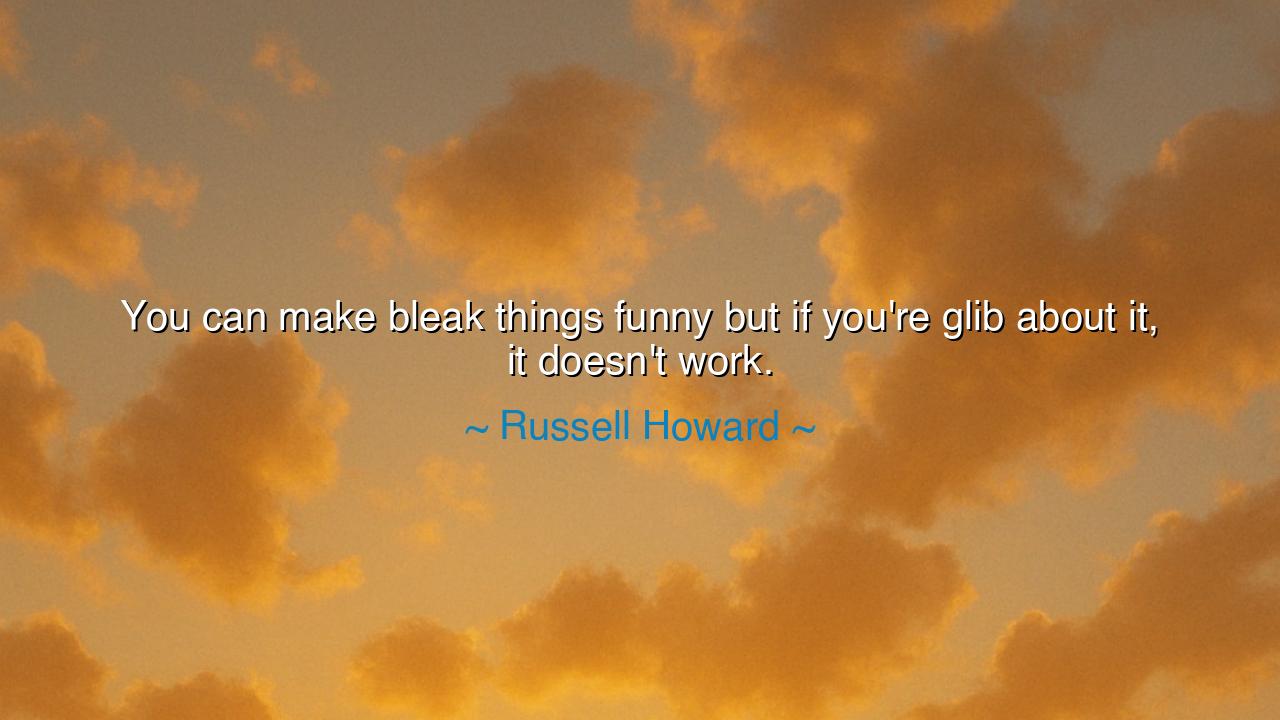
You can make bleak things funny but if you're glib about it, it






Hear, O children of laughter and sorrow, the wise words of Russell Howard, a jester with the heart of a philosopher, who once said: “You can make bleak things funny but if you’re glib about it, it doesn’t work.” Though his tone was light, his meaning was profound, for he spoke of the sacred art of humor born from darkness, and the moral weight carried by those who wield it. For comedy, like fire, can warm or destroy; it can heal the wounds of the soul or deepen them. Howard’s reflection reminds us that the power to make others laugh about pain is a gift that demands both compassion and depth.
When he speaks of “bleak things,” he means those parts of human life we would rather turn away from—the shadowed corners of grief, loss, injustice, and despair. And yet, throughout the ages, humanity has sought laughter even in the darkest hours. The soldier jokes on the battlefield, the mourner remembers a funny story at the graveside, and the oppressed find humor to survive their chains. Laughter is the light that refuses to die, even when surrounded by night. But Howard warns that such laughter must not be glib—that is, shallow, careless, or cruel. For when the comedian mocks pain without empathy, the joke rings hollow; it wounds instead of heals.
The ancients knew this balance well. In the theaters of Athens, Aristophanes and Euripides both understood that comedy and tragedy are twins born from the same mother. The great playwrights made the people laugh at war, corruption, and folly—but always with an undertone of truth, a whisper of humanity. When the laughter subsided, the audience was left wiser, their hearts purified through mirth. But when laughter is detached from compassion—when it seeks only to shock or scorn—it becomes vanity. The difference between wisdom and cruelty lies in intention. To make something “bleak” funny is not to mock its pain, but to reveal its truth in a way that brings light.
Consider, too, the story of Charlie Chaplin, whose silent films turned poverty and oppression into comedy that still moves hearts a century later. In Modern Times, Chaplin made us laugh at the inhumanity of machines and the struggles of the working class, yet behind every joke was tenderness. His tramp character never mocked suffering—he embodied it. The audience laughed not at pain, but at resilience. Chaplin knew, as Howard reminds us, that the soul of humor is not ridicule, but empathy. To treat the bleak lightly, without understanding, is to betray the sacred bond between artist and audience.
Howard’s words are also a mirror for the modern age, where humor too often becomes a weapon rather than a bridge. In a world of instant communication and easy mockery, many confuse glibness with wit, cruelty with courage. But true comedy—lasting, meaningful comedy—requires the heart to engage as much as the tongue. To make others laugh about suffering, you must first look deeply into it, and perhaps even feel it yourself. You must speak not from distance, but from shared humanity. In this, the comedian becomes healer, transforming sorrow into laughter not by dismissing it, but by honoring it through understanding.
There is a deeper truth beneath Howard’s insight: that laughter and empathy are intertwined. The bleak can only be made funny when the comedian acknowledges its weight. Humor, then, becomes an act of love, a way of saying, “I see your pain, and I will carry it lightly with you.” This is why the greatest humor often arises from hardship—it allows people to breathe, to glimpse hope amid despair. But when laughter comes without heart, it is not liberation—it is mockery dressed as mirth. Howard’s wisdom reminds us that true humor is an act of courage and compassion, not carelessness.
Therefore, take this lesson, O listener: when you find yourself tempted to joke about the sorrows of life—whether your own or another’s—pause first. Ask yourself: is this laughter born of empathy or of ego? Are you seeking to lift others, or to stand above them? Let your humor be like a lamp in the darkness, not a spark that blinds. For when you treat suffering with reverence, even laughter becomes holy. When you find the courage to face bleakness with grace and honesty, you will learn what all wise comedians and healers have known since time began: that laughter, when born from compassion, is not merely escape—it is redemption.
And so remember Russell Howard’s words as a guiding star in the art of life and expression: You can make bleak things funny—but only if your heart remembers the weight of the dark from which the laughter came. For when humor springs from love and not from glibness, it becomes something divine—the sound of humanity laughing in defiance of despair.






AAdministratorAdministrator
Welcome, honored guests. Please leave a comment, we will respond soon